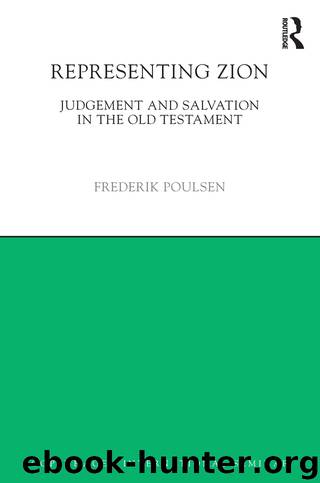Representing Zion by Frederik Poulsen

Author:Frederik Poulsen [Frederik Poulsen]
Language: eng
Format: epub
ISBN: 9781317591443
Publisher: Taylor & Francis (CAM)
Line (a) begins with ‘wait for me’, a common phrase within the psalmodic literature, where it usually expresses the anticipation of YHWH’s salvation.110 The following ‘the day when I arise as a witness’ stands for the ‘Day of YHWH’.111 On that day, YHWH will stand as a witness against (or in support of?) his people, for his decision or judgement (משפט) is to gather nations and kingdoms (cf. Jer. 1:15). Line (c) presents the ambiguous statement: ‘to pour out upon them my indignation’. Upon whom? It is either the people of YHWH and their arrogant leaders, or the nations and the kingdoms.112 The interpretation of the plural suffix in עליהם may refer to the sinful people who were accused in 3:1–7. If this is so, the nations and kingdoms are gathered as an instrument of YHWH to judge them.113 Alternatively, the suffix may refer to the nations and the kingdoms, which means that YHWH will judge them in front of his people as an act of salvation.114
In his commentary, Hubert Irsigler has a keen eye for this ambiguity. He suggests that the verse has originally expressed the judgement against the cruel leaders of Zion.115 This judgement naturally follows the serious accusations in 3:1–7 and points forward to 3:11–13 about the surviving remnant after the eliminations of the leaders. Eventually, however, some redactors have wished to establish a link to the judgements against the nations (Joel 4; obad. 15–16; Mic. 4:11–13), as a result of which they have added line (d) to express the greater and cosmic judgement of all the earth. By means of this addition, the scene is set for 3:9–10, in which the peoples are turned into pious servants of YHWH.
In short, v. 8 witnesses a clash between two different scenarios: judgement against the sinful people of YHWH instrumented by the foreign nations, and judgement against the nations leading to the salvation of the people. It is difficult to say which one is the proper one, in particular because the context of the verse seems to support both interpretations. Indeed, this ambiguity seems similar to that of Isaiah 29:5–6. Zephaniah 3:1–13 is perhaps an even better illustration of two plausible but conflicting interpretations of the same message.
Even if 3:8 is understood as a judgement against the arrogant leaders of Zion, the enemy attack does not result in a total destruction of the city. As in Isaiah, Zephaniah 3:11–13 employs the concept of a surviving remnant. Whereas the remnant in isaiah was the few who repented in time, the remnant in Zephaniah is negatively defined. The remnant is those who were not proudly exultant and haughty, as their leaders were.116 As vv. 11–12 inform us, YHWH will remove the arrogant ones who believed in the autonomy of the city, and mercifully leave a remnant (השאיר) in the midst of his city. This remnant will be ‘a people humble and lowly’ (עם עני ודל) and be called ‘the remnant of israel’ (שארית ישראל). In contrast to the deceitful leaders, the remnant will seek refuge in the name of YHWH.
Download
This site does not store any files on its server. We only index and link to content provided by other sites. Please contact the content providers to delete copyright contents if any and email us, we'll remove relevant links or contents immediately.
Periodization Training for Sports by Tudor Bompa(8240)
The Body: A Guide for Occupants by Bill Bryson(5067)
The MacArthur Bible Commentary by John MacArthur(4815)
The Sports Rules Book by Human Kinetics(4373)
What It Really Takes to Get Into Ivy League and Other Highly Selective Colleges by Hughes Chuck(3734)
Marijuana Grower's Handbook by Ed Rosenthal(3663)
The Sprouting Book by Ann Wigmore(3577)
The Martian by Andy Weir(3397)
Salt, Fat, Acid, Heat: Mastering the Elements of Good Cooking by Nosrat Samin(3135)
The Bread Bible by Rose Levy Beranbaum(3062)
Sapiens and Homo Deus by Yuval Noah Harari(3054)
Harry Potter 4 - Harry Potter and The Goblet of Fire by J.K.Rowling(3050)
The Marketing Plan Handbook: Develop Big-Picture Marketing Plans for Pennies on the Dollar by Robert W. Bly(3032)
Classic by Mary Berry(3003)
Martha Stewart's Baking Handbook by Martha Stewart(2848)
Screenplay: The Foundations of Screenwriting by Syd Field(2624)
The Plant Paradox by Dr. Steven R. Gundry M.D(2599)
50 Economics Classics by Tom Butler-Bowdon(2559)
The Cambridge Grammar Of The English Language by Rodney Huddleston Geoffrey K. Pullum(2413)
